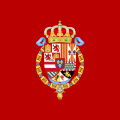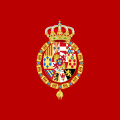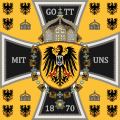Flag of Palau: Difference between revisions
No edit summary |
m 2/3 words said "disk" so the word that said "disc" was changed to "disk" to maintain consistency in spelling Tags: Visual edit Mobile edit Mobile web edit |
||
| (42 intermediate revisions by 30 users not shown) | |||
| Line 1: | Line 1: | ||
{{ |
{{Short description|National flag of Palau}} |
||
{{More citations needed|date=November 2013}} |
|||
{{ |
{{Use dmy dates|date=December 2021}} |
||
{{Use dmy dates|date=January 2013}} |
|||
{{Infobox flag |
{{Infobox flag |
||
| Name = Palau |
| Name = Palau |
||
| Line 11: | Line 8: | ||
| Image = Flag of Palau.svg |
| Image = Flag of Palau.svg |
||
| Use = 110110 |
| Use = 110110 |
||
| Symbol = {{FIAV|110110}} {{FIAV|normal}} {{FIAV|Mirror}} |
|||
| Symbol = |
|||
| Proportion = 5:8 |
| Proportion = 5:8 |
||
| Adoption = |
| Adoption = {{start date and age|1981|01|01|df=y}} |
||
| Design = A light blue field with |
| Design = A light blue field with a large yellow disk slightly leaning towards the hoist side. |
||
| Designer = Blau J. Skebong |
| Designer = Blau J. Skebong |
||
}} |
}} |
||
The ''' |
The '''Flag of [[Palau]]''' was adopted on 1 January 1981, when the island group separated from the [[United Nations Trust Territory]]. As with the flags of several other Pacific island groups, light blue is the color used to represent the ocean and the nation's place within it. While this puts Palau in common with the [[Federated States of Micronesia]] and other neighboring island groups, the disc on the flag (similar to that on [[flag of Japan|Japan's flag]]) is off-centre like that of the [[flag of Bangladesh]], but in this case the disk represents the [[moon]] instead of the sun. The current flag was introduced in 1981 when Palau became a republic. |
||
Previously, the flag of the [[Trust Territory of the Pacific Islands]] was flown jointly with the [[Flag of the United Nations|United Nations]] and [[Flag of the United States|American]] flags. The explanation for the choice of |
Previously, the flag of the [[Trust Territory of the Pacific Islands]] was flown jointly with the [[Flag of the United Nations|United Nations]] and [[Flag of the United States|American]] flags. The explanation for the choice of colors is rooted in the history and customs of the Palauan people. The light blue of the field symbolizes the Pacific Ocean, and also represents the transition from foreign domination to self-government.<ref>[https://web.archive.org/web/20060815161815/http://www.palauconcon2.com/_doc/Palau%20flag%20description.pdf Republic of Palau Convention History of the National Flag]</ref> The golden disk, which sits slightly off-center toward the hoist, represents the [[full moon]]. The [[Palauans]] consider the full moon to be the optimum time for human activity. At this time of the month, celebrations, [[fishing]], [[sowing]], [[harvest]]ing, tree-felling, and the carving of traditional [[canoe]]s are carried out. The moon is a symbol of peace, love, and tranquility. |
||
| ⚫ | Japanese [[international relations]] professor Futaranosuke Nagoshi has suggested that the Palauan flag pays tribute to the [[Rising Sun Flag]] of Japan and symbolizes amity between Palau and Japan.<ref>Futaranosuke Nagoshi (1987) 世界に生きる日本の心(''Sekai ni ikiru nihon no kokoro'', Japanese spirits being around the world). Tendensha.</ref> Former Palauan President [[Kuniwo Nakamura]] responded to this theory in an interview with the ambiguous statement, "That's one way of putting it."<ref>{{cite journal|author=Reizō Utagawa |date=December 1999 |title=Travels in Republic of Palau |journal=The Financial World |publisher=Zaikai Kenkyujo |url=http://www.yashinomi.to/micronesia/palau1.html |language=ja |access-date=2009 |
||
It is the Three of Five Flags that use the Ratio 5:8, The Others being [[Flag of Argentina|Argentina]], [[Flag of Guatemala|Guatemala]], [[Flag of Poland|Poland]], and [[Flag of Sweden|Sweden]]. |
|||
== Construction == |
== Construction == |
||
[[File:Flag of Palau (construction sheet).svg|alt=Construction sheet of the flag of Palau|thumb|Flag construction]] |
[[File:Flag of Palau (construction sheet).svg|alt=Construction sheet of the flag of Palau|thumb|Flag construction]] |
||
According to the Palauan government website, the flag is a golden-yellow full moon slightly off-centered on a field of sky blue. The width of flag is 1<sup>3</sup>⁄<sub>5</sub> of the flag's height, meaning the aspect ratio is 5:8. The moon's diameter is <sup>3</sup>⁄<sub>5</sub> of the flag's height, its center is placed on the middle of the flag's height and the <sup>7</sup>⁄<sub>10</sub> part of the flag's height from the hoist side.<ref>{{Cite web|url=https://www.palaugov.pw/about-palau/flag/|title=Flag – PalauGov.pw|language=en-US|access-date= |
According to the Palauan government website, the flag is a golden-yellow full moon slightly off-centered on a field of sky blue. The width of flag is 1<sup>3</sup>⁄<sub>5</sub> of the flag's height, meaning the aspect ratio is 5:8. The moon's diameter is <sup>3</sup>⁄<sub>5</sub> of the flag's height, its center is placed on the middle of the flag's height and the <sup>7</sup>⁄<sub>10</sub> part of the flag's height from the hoist side.<ref>{{Cite web|url=https://www.palaugov.pw/about-palau/flag/|title=Flag – PalauGov.pw|language=en-US|access-date=23 April 2020}}</ref>{{huh|date=May 2021}} |
||
[[File:Team Palau Summer Olympics 2008.jpg|thumb|[[Palau at the 2008 Summer Olympics|Palau team]] at the [[2008 Summer Olympics]] with the flag.]] |
[[File:Team Palau Summer Olympics 2008.jpg|thumb|[[Palau at the 2008 Summer Olympics|Palau team]] at the [[2008 Summer Olympics]] with the flag.]] |
||
[[File:Capitol-complex-melekeok-palau20071220.jpg|thumb|The Palau flag flies over the [[Capitol of Palau]].]] |
[[File:Capitol-complex-melekeok-palau20071220.jpg|thumb|The Palau flag flies over the [[Capitol of Palau]].]] |
||
==Supposed relationship to the Rising Sun Flag== |
|||
| ⚫ | Japanese [[international relations]] professor Futaranosuke Nagoshi has suggested that the Palauan flag (which depicts the Moon) pays tribute to the [[Rising Sun Flag]] of Japan and symbolizes amity between Palau and Japan.<ref>Futaranosuke Nagoshi (1987) 世界に生きる日本の心(''Sekai ni ikiru nihon no kokoro'', Japanese spirits being around the world). Tendensha.</ref> Former Palauan President [[Kuniwo Nakamura]] responded to this theory in an interview with the ambiguous statement, "That's one way of putting it."<ref>{{cite journal|author=Reizō Utagawa |date=December 1999 |title=Travels in Republic of Palau |journal=The Financial World |publisher=Zaikai Kenkyujo |url=http://www.yashinomi.to/micronesia/palau1.html |language=ja |access-date=3 May 2009 |url-status=dead |archive-url=https://web.archive.org/web/20090503061639/http://www.yashinomi.to/micronesia/palau1.html |archive-date=3 May 2009 }}</ref> John Blau Skebong, the designer of the flag, denied such allegation, saying there is no special connection between the two flags.<ref>{{cite web|url=http://blog.canpan.info/fukiura/archive/7313|title=パラオ国旗の作者との対話|date=26 October 2010}}</ref> |
||
==Governmental flags== |
|||
<gallery> |
|||
File:Presidental Standard of Palau.svg|Standard of the [[president of Palau]] |
|||
File:Presidential Standard of Palau (vertical).svg|Standard of the [[president of Palau]] (vertical) |
|||
</gallery> |
|||
==Historical flags== |
==Historical flags== |
||
<gallery> |
<gallery> |
||
File:Flag of Cross of Burgundy.svg|Flag of [[Habsburg Spain|Spain]], until 1842 |
File:Flag of Cross of Burgundy.svg|{{FIAV|historical}} Flag of [[Habsburg Spain|Spain]], until 1842 |
||
File: |
File:Bandera de España 1808-1813.svg|{{FIAV|historical}} Flag of [[Spain under Joseph Bonaparte|Spain]], until 1813 |
||
File:Flag of |
File:Flag of Spain (1785-1873 and 1875-1931).svg|{{FIAV|historical}} Flag of [[Spain under the Restoration|Spain]], until 1899 |
||
File:Estandarte real de 1700-1761.svg|{{FIAV|historical}} Royal flag of Spain, from 1710 to 1761 |
|||
File:Flag of German New Guinea.svg|Flag of the [[German New Guinea Company]], 1885-1899 |
|||
File:Estandarte real de 1761-1833.svg|{{FIAV|historical}} Royal flag of Spain, from 1761 to 1833 |
|||
| ⚫ | |||
File:Estandarte real de 1833-1868 y 1875-1931.svg|{{FIAV|historical}} Royal flag of Spain, from 1833 to 1899 |
|||
| ⚫ | |||
File:Flag of the |
File:Flag of the Philippines (1898–1901).svg|{{FIAV|historical}} Flag of the [[First Philippine Republic]], from January 23, 1899 to February 12, 1899 |
||
File: |
File:Flag of German New Guinea.svg|{{FIAV|historical}} Flag of the [[German New Guinea Company]], 1885–1899 |
||
| ⚫ | |||
| ⚫ | |||
File:Kaiserstandarte.svg|{{FIAV|historical}} [[German Emperor]]'s standard, from 1899 to 1914 |
|||
| ⚫ | |||
| ⚫ | |||
| ⚫ | |||
File:Flag of the |
File:Flag of the Governor of the South Pacific Mandate.svg|{{FIAV|historical}} Flag of Governor of the [[South Seas Mandate]] |
||
File:Flag of the Japanese Emperor.svg|{{FIAV|historical}} Imperial standard of the [[emperor of Japan]], from 1914 to 1944 |
|||
File:US flag 48 stars.svg|{{FIAV|historical}} Forty-eight-star flag of the [[United States]], 1944–1959 |
|||
| ⚫ | |||
| ⚫ | |||
File:Flag of the President of the United States (1916–1945).svg|{{FIAV|historical}} [[Flag of the president of the United States]], from 1944 to 1945 |
|||
File:Flag of the President of the United States (1945–1959).svg|{{FIAV|historical}} Flag of the president of the United States, from 1945 to 1959 |
|||
File:Flag of the President of the United States.svg|{{FIAV|historical}} Flag of the president of the United States, from 1959 to 1994 |
|||
| ⚫ | |||
File:Flag of the Trust Territory of the Pacific Islands.svg|{{FIAV|historical}} [[Flag of the Trust Territory of the Pacific Islands]], 1965–1981 |
|||
File:Flag of the Federated States of Micronesia.svg|{{FIAV|historical}} [[Flag of the Federated States of Micronesia]], 1978–1981 |
|||
</gallery> |
</gallery> |
||
==See also== |
==See also== |
||
* [[Flags of the states of Palau]] |
* [[Flags of the states of Palau]] |
||
* [[Flag of Japan]] |
|||
* [[Flag of Bangladesh]] |
|||
==References== |
==References== |
||
| Line 69: | Line 83: | ||
[[Category:National symbols of Palau]] |
[[Category:National symbols of Palau]] |
||
[[Category:National flags|Palau]] |
[[Category:National flags|Palau]] |
||
[[Category:Blue flags|Palau]] |
|||
[[Category:Flags with circles]] |
|||
[[Category:Blue and yellow flags]] |
|||
Latest revision as of 08:03, 5 December 2024
This article needs additional citations for verification. (November 2013) |
 | |
| Use | Civil and state flag, civil and state ensign |
|---|---|
| Proportion | 5:8 |
| Adopted | 1 January 1981 |
| Design | A light blue field with a large yellow disk slightly leaning towards the hoist side. |
| Designed by | Blau J. Skebong |
The Flag of Palau was adopted on 1 January 1981, when the island group separated from the United Nations Trust Territory. As with the flags of several other Pacific island groups, light blue is the color used to represent the ocean and the nation's place within it. While this puts Palau in common with the Federated States of Micronesia and other neighboring island groups, the disc on the flag (similar to that on Japan's flag) is off-centre like that of the flag of Bangladesh, but in this case the disk represents the moon instead of the sun. The current flag was introduced in 1981 when Palau became a republic.
Previously, the flag of the Trust Territory of the Pacific Islands was flown jointly with the United Nations and American flags. The explanation for the choice of colors is rooted in the history and customs of the Palauan people. The light blue of the field symbolizes the Pacific Ocean, and also represents the transition from foreign domination to self-government.[1] The golden disk, which sits slightly off-center toward the hoist, represents the full moon. The Palauans consider the full moon to be the optimum time for human activity. At this time of the month, celebrations, fishing, sowing, harvesting, tree-felling, and the carving of traditional canoes are carried out. The moon is a symbol of peace, love, and tranquility.
Construction
[edit]
According to the Palauan government website, the flag is a golden-yellow full moon slightly off-centered on a field of sky blue. The width of flag is 13⁄5 of the flag's height, meaning the aspect ratio is 5:8. The moon's diameter is 3⁄5 of the flag's height, its center is placed on the middle of the flag's height and the 7⁄10 part of the flag's height from the hoist side.[2][clarification needed]


Supposed relationship to the Rising Sun Flag
[edit]Japanese international relations professor Futaranosuke Nagoshi has suggested that the Palauan flag (which depicts the Moon) pays tribute to the Rising Sun Flag of Japan and symbolizes amity between Palau and Japan.[3] Former Palauan President Kuniwo Nakamura responded to this theory in an interview with the ambiguous statement, "That's one way of putting it."[4] John Blau Skebong, the designer of the flag, denied such allegation, saying there is no special connection between the two flags.[5]
Governmental flags
[edit]-
Standard of the president of Palau
-
Standard of the president of Palau (vertical)
Historical flags
[edit]-
 Flag of Spain, until 1842
Flag of Spain, until 1842 -
 Flag of Spain, until 1813
Flag of Spain, until 1813 -
 Flag of Spain, until 1899
Flag of Spain, until 1899 -
 Flag of the First Philippine Republic, from January 23, 1899 to February 12, 1899
Flag of the First Philippine Republic, from January 23, 1899 to February 12, 1899 -
 Flag of the German New Guinea Company, 1885–1899
Flag of the German New Guinea Company, 1885–1899 -
 Flag of the German colonial empire, in some of Palau from 1885 and all of the territory, 1899–1914
Flag of the German colonial empire, in some of Palau from 1885 and all of the territory, 1899–1914 -
 German Emperor's standard, from 1899 to 1914
German Emperor's standard, from 1899 to 1914 -
 Flag of Governor of the South Seas Mandate
Flag of Governor of the South Seas Mandate -
 Imperial standard of the emperor of Japan, from 1914 to 1944
Imperial standard of the emperor of Japan, from 1914 to 1944 -
 Forty-eight-star flag of the United States, 1944–1959
Forty-eight-star flag of the United States, 1944–1959 -
 Flag of the president of the United States, from 1944 to 1945
Flag of the president of the United States, from 1944 to 1945 -
 United Nations flag, 1947–1965
United Nations flag, 1947–1965 -
 Flag of the Federated States of Micronesia, 1978–1981
Flag of the Federated States of Micronesia, 1978–1981
See also
[edit]References
[edit]- ^ Republic of Palau Convention History of the National Flag
- ^ "Flag – PalauGov.pw". Retrieved 23 April 2020.
- ^ Futaranosuke Nagoshi (1987) 世界に生きる日本の心(Sekai ni ikiru nihon no kokoro, Japanese spirits being around the world). Tendensha.
- ^ Reizō Utagawa (December 1999). "Travels in Republic of Palau". The Financial World (in Japanese). Zaikai Kenkyujo. Archived from the original on 3 May 2009. Retrieved 3 May 2009.
- ^ "パラオ国旗の作者との対話". 26 October 2010.
























